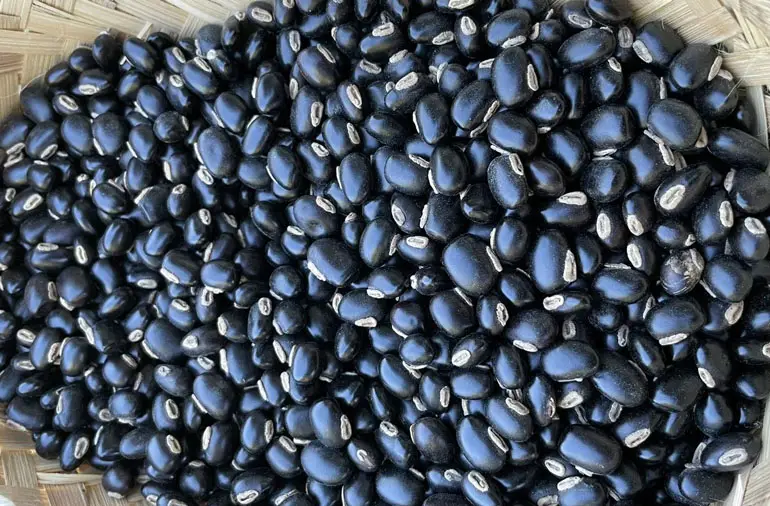Also known as velvet bean, cowhage, or kapikachhu, Mucuna pruriens has been revered in traditional medicine systems for its diverse therapeutic properties.
Let’s embark on a journey to explore the intricacies of Mucuna pruriens, delving into its benefits, potential side effects, optimal dosage, and its remarkable impact on various facets of human health.
What is Mucuna pruriens?
Mucuna pruriens is a tropical legume native to Africa and tropical regions of Asia. The plant’s unique feature lies in its furry pods, which, upon contact, can cause itching due to the presence of serotonin and a protease called mucunain.

However, beyond its defensive mechanism, Mucuna pruriens is cherished for its seeds, recognized for their therapeutic potential.
It is a good source of L-Dopa (4 – 7%), from which dopamine is made in the body. The considerable L-dopa content serves a prime source for extracting pure L-dopa commercially, crucial in Parkinson’s disease treatment.
Mucuna pruriens benefits
Largely unfamiliar in the United States, Mucuna pruriens is gaining attention from neurologists, proving its relevance in herbal medicine. It enhances dopamine synthesis, often called the happiness hormone.
Explore the notable properties and benefits of Mucuna Pruriens seeds.
Mucuna Pruriens And Parkinson disease
One of the most prominent applications of Mucuna pruriens is in managing Parkinson’s disease. Research suggests that the high levodopa content in Mucuna pruriens seeds, a precursor to dopamine, can offer relief to Parkinson’s patients.
Dopamine is a neurotransmitter that plays a crucial role in attention, motivation, and executive functions.
Studies, including one published in the “Journal of Alternative and Complementary Medicine,” have indicated its efficacy in alleviating symptoms with fewer side effects compared to conventional treatments.
Mucuna Pruriens for depression
The seeds contain L-DOPA, a precursor to dopamine, playing a pivotal role in the regulation of mood.
Mucuna pruriens has been shown to have antidepressant effects. A study conducted in 2012 found that Mucuna pruriens was effective in reducing symptoms of depression in rats.
Another study conducted in 2015 found that Mucuna pruriens was effective in reducing symptoms of depression in humans.
Mucuna pruriens and ADHD
While scientific research on Mucuna pruriens and ADHD (Attention Deficit Hyperactivity Disorder) is still in its early stages, some studies suggest potential advantages.
ADHD is often associated with imbalances in dopamine levels. The L-DOPA content in Mucuna pruriens may contribute to regulating dopamine levels in the brain.
Dopamine is involved in the brain’s reward and pleasure pathways, and its dysregulation can impact attention and focus. By influencing dopamine levels, Mucuna pruriens may aid in improving attention and focus, which are key challenges in individuals with ADHD.

Some studies suggest that Mucuna pruriens exhibits neuroprotective properties. ADHD has been associated with alterations in the structure and function of certain brain regions. The neuroprotective effects of Mucuna pruriens may contribute to preserving brain health and mitigating some ADHD-related challenges.
Oxidative stress has been implicated in various neurological disorders, including ADHD. Mucuna pruriens contains antioxidants that may help combat oxidative stress and reduce inflammation. This antioxidant activity may contribute to overall brain health and potentially alleviate ADHD symptoms.
In addition to dopamine, Mucuna pruriens contains serotonin precursors. Serotonin is also a neurotransmitter involved in the regulation of mood. While the relationship between serotonin and ADHD is complex, addressing mood-related aspects can have a positive impact on overall well-being and may indirectly influence ADHD symptoms.
Benefits for fertility and libido
Traditional medicine has long employed Mucuna pruriens for enhancing fertility and libido. Scientific investigations support this traditional wisdom.
For men dealing with fertility issues, semen quality is a critical factor. Some studies suggest that Mucuna pruriens supplementation may positively influence semen parameters, including sperm count, motility, and morphology. Improved semen quality enhances the chances of successful fertilization.
A study conducted in 2010 found that Mucuna pruriens was effective in improving semen quality and testosterone levels in infertile men.
Another study conducted in 2017 found that Mucuna pruriens was effective in improving sexual function in women with sexual dysfunction.
Chronic stress can have detrimental effects on fertility and sexual function. Mucuna pruriens has adaptogenic properties, which means it may help the body adapt to and manage stress. By reducing stress levels, Mucuna pruriens may indirectly support reproductive health.
Mucuna pruriens dosage
Determining the right dosage of Mucuna pruriens requires precision to harness its benefits without triggering adverse effects.
Dosage recommendations may vary, but it’s advisable to start with a lower dose and gradually increase while monitoring for any adverse reactions.
For Parkinson’s disease, the recommended dosage is 15 grams of Mucuna pruriens powder per day.
The recommended mucuna pruriens dosage for depression is 5 grams of Mucuna pruriens powder per day.
For fertility and libido, the recommended dosage is 5 grams of Mucuna pruriens powder per day.
Consulting with a healthcare provider is crucial to establish a personalized and safe dosage.
Mucuna pruriens side effects and dangers
While Mucuna pruriens offers an array of benefits, it’s essential to be aware of potential side effects.
Mucuna pruriens is typically safe when consumed in recommended doses. Excessive consumption may lead to side effects such as nausea, vomiting, or hallucinations.
Individuals with pre-existing conditions or those taking medications such as antidepressants and antipsychotics should consult a healthcare professional before incorporating Mucuna pruriens into their regimen.
Mucuna pruriens should not be used by pregnant or breastfeeding women.
Conclusion
Mucuna pruriens, a tropical legume, has been employed for millennia in Ayurvedic medicine.
It has been shown to have a number of health benefits, including reducing symptoms of Parkinson’s disease, improving symptoms of depression, improving symptoms of ADHD and increasing fertility and libido.
Due to its various health advantages, GenF20 Plus spray incorporates Mucuna Pruriens. By combining this oral spray with the GenF20 Plus HGH releaser, you can elevate your growth hormone levels and improve your health in general.
If you are considering taking Mucuna pruriens, it is important to speak with your doctor first to determine if it is safe for you to do so.
